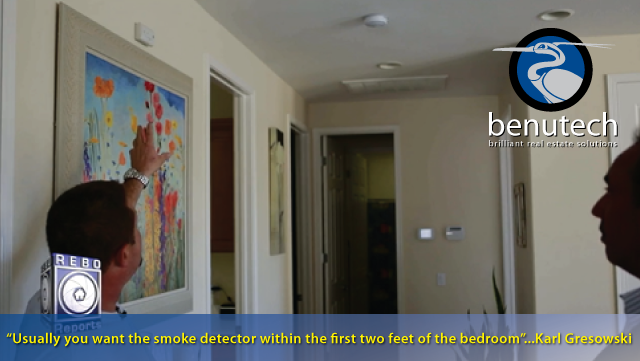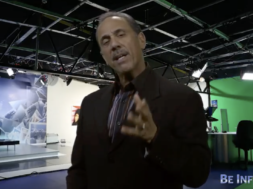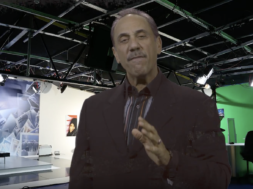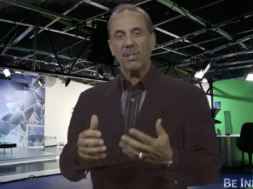Smoke detectors (and their cousins, the carbon monoxide detectors) are important enough to warrant their own video in our series on home inspections. While we all hope to never need them, it is important to pay extra attention to them when buying (or helping someone else buy) a new home. In this video, Eagle Home Inspections’ Karl Gresowski guides Benutech’s Tom Iovenitti through his inspection process for smoke detectors, paying particular attention to factors like wiring and positioning. Take the time to watch this video to increase your awareness of these easily overlooked lifesavers, and feel more confident about your clients’ safety in their new homes.
KARL GRESOWSKI: Yeah, every hallway, upstairs and downstairs, should have a smoke detector in the living space. Also, the bedrooms should have a smoke detector. Usually we want to see CO detectors within 15 feet of the bedrooms, upstairs and downstairs.
IOVENITTI: So, explain a CO detector.
GRESOWSKI: CO detector is to be able to monitor the carbon monoxide from gas appliances. So that way if there is any leakage, it’s going to sound off so we know we have a leak somewhere, so we can address that.
IOVENITTI: So, I take it CO rises?
GRESOWSKI: It can. Yes. CO can rise. That’s usually the basic. Those are usually put, best place is eye level because most people only sleep 2 ½ feet off the ground.
IOVENITTI: I see.
GRESOWSKI: Ok, so if it’s coming up the stairs, usually eye level is the best place to put them. But they do make ones for the ceiling, and they’re usually pretty sensitive, so we should have no problem.
IOVENITTI: Are these battery operated?
GRESOWSKI: Most of them are battery operated. They do have hardwired ones.
IOVENITTI: So, smoke detectors, in every hallway, inside the bedrooms, is that correct?
GRESOWSKI: Yes. That is correct.
IOVENITTI: Those are hardwired in most of the time?
GRESOWSKI: On the newer homes. If the homes are older, usually it will only have the hard-wired ones in the hallways, and then they do battery operated in the bedrooms. Now, if we’re in an older home, sometimes we’ll see the hardwired ones removed and they’ll have battery operated. We’ll always recommend to put the hardwired one back in and check the electrical, make sure it’s operating properly.
IOVENITTI: How about alarm systems and fire systems? Do you check those?
GRESOWSKI: No. Alarm systems are done by ADT, and the alarm companies, because when you move in they’re going to change it and give you all the new modern stuff. A lot of those have built-in CO detectors and smoke alarms too, that the company will monitor for you.
IOVENITTI: I see. So, if they’re hardwired in, would that be something that you would check in the electrical panel?
GRESOWSKI: Well, in electrical panel usually it’ll be listed that they’re part of the alarm system or the fire sprinkler system.
IOVENITTI: Oh, I see. So they’re a separate component.
GRESOWSKI: They’re a separate component. And the fire sprinkler systems in the newer homes, which we see a lot of today, we’ll usually recommend those to be serviced every few years. Commercial service every year. So what we’ll want to do on our fire sprinkler system is have them drain the system, check the heads, make sure they weren’t recalled, and make sure there’s no possible leaks.
IOVENITTI: So I notice that this one at the top of the stairway is by a vent, would that be of a concern to you?
GRESOWSKI: No, it would not, as long as it’s… Because what happens is that is the heater vent. What happens is a sucking in if it’s on, or A/C, so that’s not blowing away. So if, say, they’re sleeping and the heater’s on, and say there is a carbon monoxide leak inside the furnace, hopefully it’s going to bring the carbon monoxide past that, or smoke past these two, and go off faster.
IOVENITTI: In a home where you’re inspecting, if you see smoke detectors, the placement of that is pretty important, I would take it, especially when you have homes that potentially have these fans in each room and things of that nature.
GRESOWSKI: Yes. Usually you want the smoke detector within the first two feet of the bedroom, as soon as you go under the door, because usually the bed’s all the way at the back. We want to sound them off as soon as possible. In the hallways, we just want them centrally located. Sometimes in a hallway like this, we’ll have two if the bedrooms are on each side. They’ll sometimes place two of them in there. This one only has one.
IOVENITTI: Do you recommend two?
GRESOWSKI: Depends what sleeping quarters are. If we have sleeping quarters on that side of the house and on this side, yes I would recommend two.
IOVENITTI: Ok. Well, thank you so much for that. Again, Tom Iovenitti, we’re off to the next, stay tuned.


















